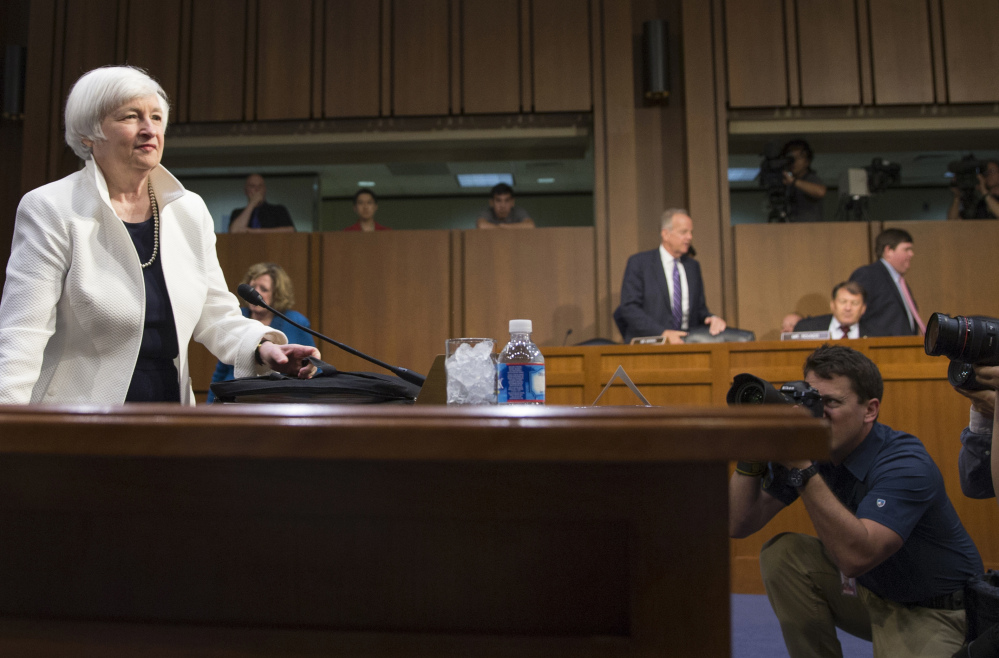WASHINGTON — The job market is humming, and so are the U.S. financial markets, with major stock indexes near record highs.
All that would normally trigger a green light for the Federal Reserve to raise interest rates – especially when they’re barely above all-time lows. Yet the Fed, still casting a wary eye on the economy, has yet to signal that it will resume raising rates soon.
That signal, though, could come as soon as Friday, when Fed Chair Janet Yellen will address the annual meeting of the world’s central bankers in Jackson Hole, Wyoming.
Fed leaders have sometimes used the Jackson Hole event to announce major policy shifts. In 2010, for example, Chairman Ben Bernanke signaled that the Fed was considering a new round of bond purchases to try to help a struggling economy emerge from the wreckage of the Great Recession. The Fed’s purchases were intended to shrink long-term loan rates to spur borrowing and spending.
Some economists say they think conditions are ripe for Yellen to alert investors that the central bank may be inclined to act at its next policy meeting, Sept. 20-21 – especially in light of recent remarks from other Fed officials.
Two close Yellen allies – William Dudley, president of the Federal Reserve Bank of New York, and Stanley Fischer, the Fed’s vice chairman – have suggested in the past week that a strengthening economy will soon warrant a resumption of the rate increases the Fed began in December. That was when it raised its benchmark lending rate from near zero, where it had been since the depths of the financial crisis in 2008.
“We’re edging closer towards the point in time where it’ll be appropriate to raise interest rates further,” Dudley said in an interview with Fox Business Network.
And in a speech, Fischer offered an upbeat economic view, saying, “We are close to our targets.” Fischer added that, apart from volatile energy and food prices, chronically low inflation is now “within hailing distance” of the Fed’s 2 percent target.
Sung Won Sohn, an economics professor at California State University, Channel Islands, interpreted the officials’ comments to suggest that support is growing among Yellen and others on the Fed’s policymaking board for another rate increase as early as next month.
“The probability of a hike at the September meeting has gone up and will go up more after Yellen speaks,” Sohn said.
David Jones, chief economist at DMJ Advisors, agreed that the chances of a September rate increase are rising, especially if forthcoming economic data, including next week’s jobs report for August, show strength.
But other economists say they think December remains a more likely time for a resumption of rate increases. And some say that if the Fed does decide to act in September, it would need to further prepare investors. According to data from the CME Group, investors foresee only about a 24 percent probability of a rate increase in September and only about a 56 percent chance by December.
Diane Swonk, chief economist at DS Economics, suggested that one reason U.S. stock averages established highs so soon after Britain’s June vote to leave the European Union escalated global economic fears is the belief among many that the Fed will leave rates alone until perhaps year’s end.
Send questions/comments to the editors.



Success. Please wait for the page to reload. If the page does not reload within 5 seconds, please refresh the page.
Enter your email and password to access comments.
Hi, to comment on stories you must . This profile is in addition to your subscription and website login.
Already have a commenting profile? .
Invalid username/password.
Please check your email to confirm and complete your registration.
Only subscribers are eligible to post comments. Please subscribe or login first for digital access. Here’s why.
Use the form below to reset your password. When you've submitted your account email, we will send an email with a reset code.